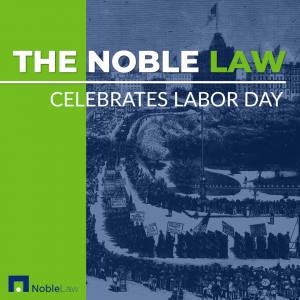As an Employment Law firm advising and representing employees on both Federal and State laws, each year, we reflect on the history of labor movements and the advancement of workers’ rights.

What is Labor Day? What does it represent?
Labor Day is the first Monday of September and is dedicated to the social and economic achievements of the American worker. These achievements, such as 8-hour workdays, compensated overtime, safety in the workplace, healthcare, and retirement benefits, were a result of labor organization, awareness, and legislative struggle and resistance from American workers to their employers. Employees disputed their unfavorable working conditions and stood up together to establish employment standards that we value to this day.
Labor Movements of American Society. Roots of Change.
In the labor force, women and minority populations have historically been marginalized, and these workers’ movements played a vital role in advancing labor and women’s rights in the United States. Here are some of the most significant events that have led to the protections we enjoy today.
We can tie the labor movement back as early as 1834, when “mill girls” in Lowell, Massachusetts, banded together to dispute wage cuts. This strike began the long road for change in the labor force. In 1843, the Lowell Female Labor Reform Association began petitioning for 10-hour workdays. Changes in the workday to a standard of 10-hours paved the way for the wage and hour laws that we have today, requiring that employers pay employees overtime when working more than 40 hours per week.
Sixty-eight years later, in 1911, tragedy hit the Triangle Shirtwaist factory. On March 25th, 1911, a fire erupted on the top floors of the factory, but workers, many of them young women, were locked inside, resulting in the death of approximately 146 women and 78 non-fatal injuries. Some even jumped to their death to avoid being burned alive. Owners of the factory had locked the doors to prevent theft at the end of the shift, but this put workers at risk. As a result, businesses have restrictions in place now, such as requiring exit doors to be unlocked and open outward.
As a monumental move towards equality, President John F. Kennedy signed the Equal Pay Act of 1963 into law, banning wage discrimination based on gender. The Equal Pay Act was vital in establishing a precedent for pay equality but did not do enough to stop all forms of discrimination experienced by marginalized workers.
President Barack Obama attempted to take this one step further in 2009 by signing the Lilly Ledbetter Fair Pay Act into law. This legislation restored the rights of women to sue over pay discrimination.
Efforts to advance workers’ rights continue today to protect groups that are still marginalized in the workplace, such as immigrants, minorities, LGBTQ members, and differently-abled workers. Organizations such as the AFL-CIO exist to extend worker rights further, and government agencies such as the Equal Employment Opportunity Commission protect workers based on laws already in place. When unions are not established or effective, individuals must rely on existing laws or employment law firms to represent their interests.
The Ongoing Disputes of the American Worker
Today we still see employees having disputes with their employers, but these have changed over time. While we do not often see child labor today or inhumane working conditions, however, we are still often plagued by discrimination in hiring and promotion decisions. We see discrepancies in the compensation and treatment of employees that must be addressed through both advocacy and adjudication.
At The Noble Law, we celebrate those that have improved the workplace, for both employers and employees, throughout our history, and for the small part we have been able to play to level the field.
Have a safe, happy, and healthy Labor Day Weekend.
-The Noble Law Team

